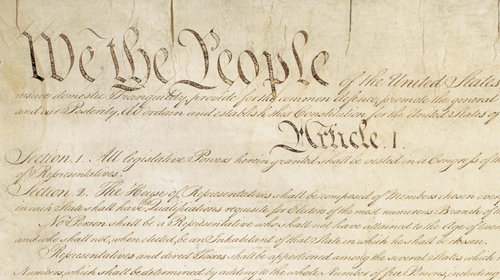
This post originally appeared on .
For an organization that works on issues as diverse as drones, women's rights, racial justice, war powers, immigration and flag burning, internal debates are inevitable and healthy. We welcome them. One of those long-standing debates has become more animated recently as the Senate considers a constitutional amendment that would empower Congress and the states to regulate even non-partisan political debate without regard for the First Amendment's freedoms of speech, assembly and petition.
In advance of a vote on the amendment, several former ACLU officials wrote to the Senate criticizing the ACLU's current stance on campaign finance laws. Professor Geoffrey Stone penned a similarly critical here in support of the letter.
We have enormous respect for Professor Stone and our former colleagues, and we share many of their concerns about the integrity of our political system. We also agree that our campaign finance system needs to be reformed. For that reason, the ACLU supports public financing programs that provide candidates with resources to mount a meaningful challenge against wealthy opponents such as the matching dollar system in the Fair Elections Now Act. We support tailored disclosure requirements. We support stronger rules to ensure that outside political advocates are not illegally coordinating their activities with candidates. And we support reasonable limits on direct contributions to candidates.
But history has taught us to be wary of proposals that would empower the government to monitor, regulate, and ultimately criminalize political speech. For instance, with the McCain-Feingold bill in 2002, Congress made it a criminal offense for groups like the ACLU or Sierra Club to even mention a candidate in certain communications paid for by general treasury funds in the crucial run-up period to elections and primaries.
The constitutional amendment under consideration in the Senate is even broader in some ways. It would allow the federal and state governments to limit spending, including spending by private citizens, that lawmakers say could "influence elections." Even proponents of the amendment have acknowledged that this authority could extend to books, television shows or movies, such as Hillary Clinton's Hard Choices or a show like the West Wing, which depicted a heroic Democratic presidential administration during the crucial election years of 2000 and 2004. It could even reach the ACLU's letter to Congress on the amendment noting that all of its sponsors are Democrats (or independents who caucus with the Democrats).
Professor Stone suggests that restrictions on campaign-related speech are somehow less troublesome if they apply in a non-partisan fashion. Without doubt, it would be worse to pass a law that attempted to limit speech by Democrats and not Republicans, or vice-versa. It does not follow, however, that we can or should accept a regime in which the government gets to decide how much speech is enough in the political arena.
That problem is compounded, moreover, by the inherent difficulty in deciding what speech is campaign-related and thus subject to regulation. Take the common example of a newspaper ad that supports a legislative proposal that a candidate for office also supports. Does that ad support the pending bill or does it support the candidate? Is it intended to influence policy or an election? And do we really want government officials to decide when they may be prompted by ulterior political motives?
There really isn't that much blue water between Professor Stone, our former colleagues and the ACLU. They want more transparency around campaign funding. We want to be sure advocacy on important issues of the day remains unrestrained. These two goals are both worthy and not mutually exclusive, yet so much of the rhetoric suggests they are. It's time for advocates on all sides of the issue to talk with one another, not past one another.
In sum, this is a tough issue, but the desire to do something should not lead us to abandon core free speech values that have served us so well for more than two centuries.
Learn more about the First Amendment and other civil liberties issues: Sign up for breaking news alerts, , and .


